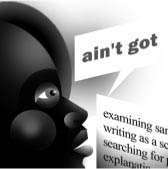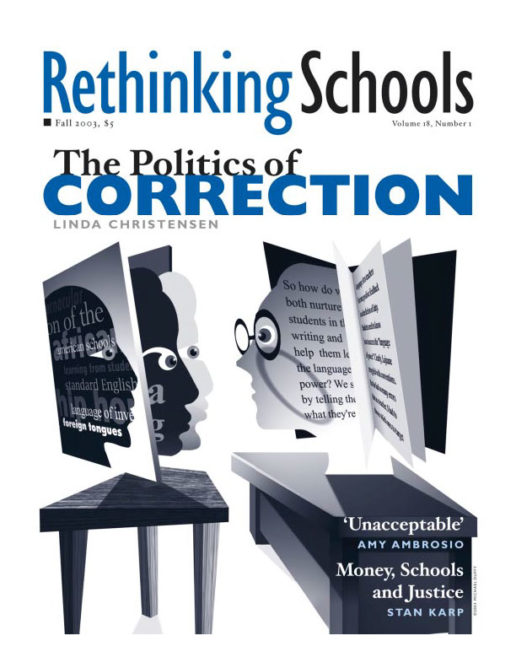Talking Wrong
Illustrator: Michael Duffy

An anxious immigrant at 64, my mother says she is learning English. After pulling Sears Best cinnamon stockings to a roll beneath her knees and sitting that Baptist ski slope of a hat on her head, she rides the rattling El train to a steel spire in downtown Chicago, pulls back her gulp as the glass elevator hurtles upward, and comes to sit at a gleaming oak table across from a pinstriped benevolent white angel who has dedicated two hours a week to straightening the black, twisted tongues of the afflicted. It is this woman’s job to scrape the moist infection of Aliceville, Alabama, from my mother’s throat.
“I want to talk right before I die,” Mama says, “Want to stop saying ain’t and I done been , like I don’t have no sense. I done lived too long to be stupid, acting like I just got off the boat.”
My mother has never been on a boat.
But 50 years ago, a million of her, clutching strapped cloth suitcases and peppery fried chicken in waxed bags, stepped off the buses at the Greyhound depot in Chicago, eagerly brushing the stubborn red dust from their shoes.
“We’re North now,” they said in their southern tongues, as if those three words were vessels big enough to hold all those dreams with bulging seams.
My mother’s northern dreams were simple, but huge. She thought it a modern miracle to live in a box stacked upon other boxes, a tenement apartment where every surface smelled of Lysol and effort, and plump roaches, cross-eyed with spray, dropped dizzily from the ceiling into our food, our beds. Mama’s huge dream required starch-stiff pinafores. Orlon sweaters with embroidered roses, and A-line skirts in the color of winter. There had to be a tavern on the corner with a jukebox where men begged forgiveness in gravel voices and a comfortable stool by the door where Mama could sit and look like a Christian who was just leaving.
She needed a job that didn’t involve soil or branches, in a factory where she could work in a straight line with other women, no talking allowed, their heads heavy and drooping with dreams. And within walking distance of wherever she lived, there had to be a Baptist Church where she could pull on the pure white gloves of service and wail to the rafters when she felt the hot, icy hand of the Holy Ghost pressing insistently at the small of her back. Yes, Jesus had to be there after all. He had blessed her journey so far, quickened her step, stroked her free of the Delta. She was his child, building herself anew here in the North where the burning of her hair was a ritual and she’d given up wearing pants because the Lord reckoned she should.
Her dreams for the most part realized, my mother now busies herself preparing for burial, stashing away money to pay for her own coffin, not wanting to bother me, as she says, “with that nonsense.” She sternly relates the story of the dutiful daughter who neglected details, so her dead mother’s body was sent to church #1 while everyone waited to mourn in church #2, and if that happened, “Chile, I’d be so embarrassed,” No mother, I think, you would be so dead, but I don’t say that out loud, because Annie Pearl Smith is not a fan of humor.
I know that she doesn’t believe that men ever landed on the moon — that the whole thing was staged in a desert in Arizona because “American folks are stupid that way and always will be.”
I know she had a hysterectomy and never told me.
I know that her motto was “Always be respectful of white folks.”
But I never knew that the way she spoke was ever a problem for anyone. Especially her.
My mother’s voice: It’s like cornbread, buttery and full of places for heat to hide. When she is angry, it curls into a fist and punches straight out. When she is scared, it gathers strength and turns practical, matter-of-fact. Like when she is calling her daughter to say, “They found your father this morning, someone shot him and he is very dead.”
She cannot sing, not a lick, not at all. When she tries, her voice cracks and collapses and loses all acquaintance with a key, and every Sunday morning in church, of course, my mother’s voice is the loudest, wild, and unleashed and creaking toward glory. I don’t think the Lord is allowed to cover His ears.
When my mama talks, the sound is flat and broad and wild with unexpected flowers, like fields in Alabama. Her rap is peppered with ain’t gots and don’t have nones and I done beens and she be’s and he be’s the way mine is when we are sweet color among coloreds and don’t have to worry about being graded. I see no shame in this.
But one of my mother’s leftover dreams is not to meet Sidney Poitier or travel to Jamaica, it’s to wash history from her throat, to talk like a woman who got some sense and future, to talk English instead of talking wrong.
Talking wrong.
I pick up the phone these days and my mother is on the other end, precisely using her new mouth. I always counted on her to rip a hole in my carefully crafted cocoon, to talk to me one colored girl to another, to warm me up with double negatives. It hurts to hear the measured effort, which conjures a picture of the two of her on the Greyhound bus headed for the Windy City from Alabama — my southern mother in one seat, her sweet mouth sewn shut, and my northern mother in the other, dreaming of perfection and heading for hell.

